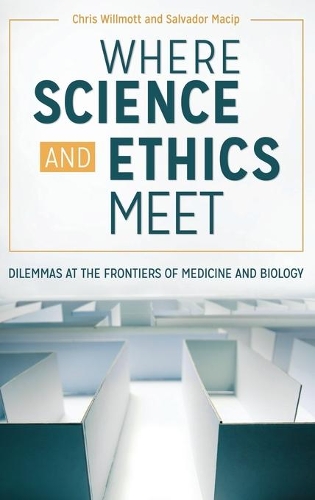
Where Science and Ethics Meet: Dilemmas at the Frontiers of Medicine and Biology
(Hardback)
Publishing Details
Where Science and Ethics Meet: Dilemmas at the Frontiers of Medicine and Biology
By (Author) Chris Willmott
By (author) Salvador Macip
Bloomsbury Publishing PLC
Praeger Publishers Inc
13th June 2016
United States
Classifications
Tertiary Education
Non Fiction
Medical ethics and professional conduct
174.2
Winner of Outstanding Academic Title, 2017 2018
Physical Properties
Hardback
192
Width 156mm, Height 235mm
510g
Description
Through engaging case studies and clear explanations of the underlying science, this book makes the social impacts and ethical consequences of recent advances in biomedicine understandable for general readers. Recent biomedical discoveries promise considerable improvement in the quality of human life, but they also hold the potential to permanently alter society. Are the anticipated benefits worth the price we would have to pay for them In Where Science and Ethics Meet: Dilemmas at the Frontiers of Medicine and Biology, a biochemist and a biomedical researcher who are highly experienced in explaining ethics for lay audiences present the most innovative advances in biomedicine and enable readers to develop their own opinions about the ethical and social consequences these technologies will bring. Each controversial topic in modern medicine and ethics is introduced through a hypothetical case study that highlights thorny ethical issues before explaining the key aspects of the science and technology involved and addressing the associated ethical considerations in detail. The interdisciplinary treatment of the topics makes the book relevant to students of science, medicine, ethics, law, and sociology as well as health care professionals.
Reviews
I would highly recommend this book to someone thinking about studying ethics, or simply as an entertaining read. . . . [T]he issues discussed make for stimulating conversation, and for this very reason the book would be a welcome addition on my shelf. * BioNews *
This book is a fantastic introduction to the major ethical issues facing modern science. . . . This would be an ideal textbook for biomedical ethics courses, as it offers an easily digestible initiation into the current moral dilemmas that are and will be addressed by scientific researchers, health practitioners, and society for years to come. It cannot be more highly recommended for all readersbench scientists, medical professionals, and general readers alike. Summing Up: Essential. All readers. * Choice *
Overall, the book represents a valuable contribution to the ethics of new developments in medicine and biology. Despite the multiplicity of competing views regarding the moral standing of new biotechnologies and practices, Willmott and Macip fulfill their promise of providing epistemologically balanced tools to the reader. The authors begin each chapter by presenting an everyday story that exemplies the challenges, limits, and questions raised by the technology or practice. This approach catches the reader's attention from the outset. Finally, the dialogical style of presenting the story earns the reader's sympathy, certainly a useful tool to begin ethical reflection. . . . [The book] certainly represents a valuable tool for teaching ethics at the undergraduate level and for engaging a wider audience in the challenges arising from scientific and biotechnical developments. * The Biochemist *
This book is the best introduction to the topic that I have ever seen. . . . In a highly original way, it educates and engages readers in the profound issues and choices made possible by advances in biomedicine. . . .This is exactly the kind of book that can help readers think clearly about biomedical advances whose speed always seems to outstrip the capacity to analyze and weigh the ethical implications of the choices they pose. * Cambridge Quarterly of Healthcare Ethics *
Where Science and Ethics Meet calls attention to both the benefits and shortcomings of the human desire to 'play God,' and the various implications this has for modern society as a whole. The sheer speed and vigour with which scientific research has propelled itself forward is often so blinding that we tend to forget about the negative consequences of such novel developments. Wilmott and Macip present the issues in a balanced way, leaving it up to the reader to draw their own conclusions from the information given. . . . the book [is] ideal for those already beginning their studies into the subject, or simply those curious to venture into something new. . . . Wilmott and Macip write to inform their readers on an easily understandable level, and to stimulate questions within the next generation of budding bioethicistsobjectives which they achieve with ease. Anyone unfamiliar with, or new to the subject area should definitely buy a copy, as it truly is a aluable tool in learning how to approach debate, and offers a much more practically applied approach to education in bioethics than many books. * The New Bioethics *
This is a very engaging book and a perfect introduction to the minefield that is bioethics. . . . Both authors are lecturers at Leicester University and this book reflects their experience in teaching and engaging students and, as such, offers ideal material for students from a range of disciplinesscience, medicine, ethics, law, and sociology. . . . There is enough meat here to satisfy anyone who wants to be better informed and to think seriously about ethics at the frontier of medicine and biology. And for those who know it all already(!) this book would be a great resource to keep to hand for talks, discussions, and teaching. * Science & Christian Belief *
Author Bio
Chris Willmott, PhD, is a senior lecturer in the Department of Molecular and Cell Biology at the University of Leicester, UK. Salvador Macip, MD, PhD, is a lecturer in the Department of Molecular and Cell Biology at the University of Leicester, UK, where he leads a research group on cancer and aging.
